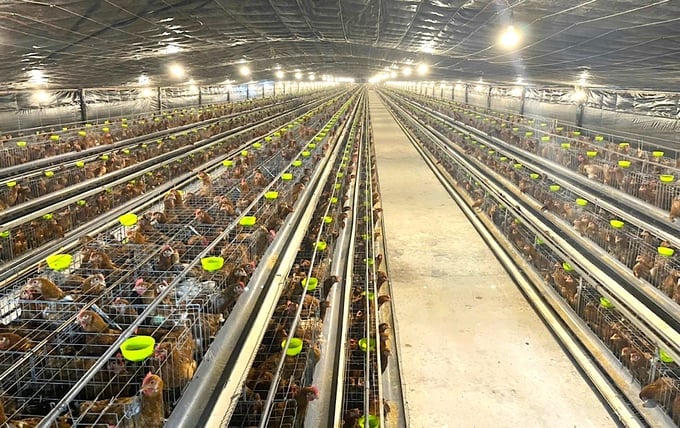June 18, 2025 | 23:06 GMT +7
June 18, 2025 | 23:06 GMT +7
Hotline: 0913.378.918
June 18, 2025 | 23:06 GMT +7
Hotline: 0913.378.918

Dr. Nguyen Quoc Dat, Vice President of the Vinaruha. Photo: Minh Dam.
Dr. Nguyen Quoc Dat, Vice President of the Vietnam Ruminant Husbandry Association (Vinaruha), said that poultry farming faces many opportunities to "transform" and thrive.
Our most significant advantage is that production technology in the industrial livestock sector is increasingly modern, helping to increase livestock productivity, reduce costs, improve product quality, and competitiveness in the market.
In addition, official product exports are gradually being opened up. Currently, egg consumption in developing countries is only 8.9 kg per person. In contrast, in developed countries, it is 13.8 kg per person, so the potential for egg consumption in our country is still enormous.
The demand is increasing, and it is expected to reach 250 eggs per person by 2030. According to forecasts, global egg consumption in the next ten years will increase by 5.4%. Meanwhile, egg production and output growth rate grow by 5 - 6% annually.
Specifically, the total flock of chickens and ducks accounts for 1.95% of the world's total flock, but meat production accounts for only 1.72%, and egg production accounts for 0.78%.
The average number of eggs per person is 190, 25 lower than the world's. From there, it reinforces the view that our country still has much room for developing egg-laying poultry farming. However, improving the quality of domestic poultry eggs needs to be done.
According to Mr. Dat, the Vietnamese poultry farming industry faces many challenges. Most worryingly, epidemics are still a constant threat.
Avian influenza, white dysentery, Marek's disease, and other viral diseases reduce egg production. Breeding is an important factor affecting productivity and product quality, so it needs more attention because there is currently no standard breeding system.
High-yield poultry breeds specializing in eggs must be imported, so high input prices significantly affect product prices, leading to competitive advantages for FDI enterprises. Therefore, domestic enterprises should focus on breeding production, slaughterhouses, processing, exporting, etc., to increase competitiveness.

Egg poultry farming faces the challenge of improving quality. Photo: Minh Dam.
In addition, livestock farmers are also apprehensive about the problem of importing beef, pork, and chicken, which can affect Vietnam's livestock farming because the imported meat price is always lower than the selling price in Vietnam.
According to Dr. Nguyen Quoc Dat, the high cost of imported breeding stock to Vietnam and low livestock productivity in Vietnam lead to high costs.
"In the future, the Vinaruha will propose to limit the import of meat from abroad and, at the same time, have policies to support the development of domestic livestock farming," he said.
From this situation, Dr. Nguyen Quoc Dat said that the solution that needs to be done is to strengthen and manage the national breeding system well, ensuring the factors of selection pressure, breeding stock structure, and disease control. In particular, it guarantees a domestic breeding stock of 5 million and an imported breeding stock of 4 - 4.8 million.
In addition, he proposed a series of other solutions, such as strengthening the material and technical facilities for breeding facilities. Check productivity and inspect the quality of breeding stock. Building and implementing critical programs for processing and exporting poultry products and innovating poultry production and processing technology.
We are applying measures to limit the import of poultry products to protect domestic production and have policies to encourage businesses to invest in the livestock sector, innovating production organization methods. We are standardizing statistical data on the production and trade of the poultry industry and strengthening communication and promotion activities.
The domestic poultry flock has grown strongly recently, with a total herd of nearly 560 million birds, ranking 10th in Asia and 31st globally, but export capacity still needs to succeed.
In the structure of chicken farming, the Northern region has a more significant proportion than the Southern region, accounting for about 60% of the total chicken flock in the country. In particular, chicken farming is mainly concentrated in the Red River Delta and the Mekong River Delta, with proportions of 23% and 22%, respectively.
In recent years, poultry flocks have shifted to the North Central & Central Coast and Southeast regions, gradually decreasing in the Red River Delta and Mekong River Delta.
According to the Department of Livestock Production, the total output of fresh poultry meat increased by an average of 17.63% annually from 2018-2022. Of which, the proportion of chicken meat accounted for 76.0 - 78.8%. The proportion of goose meat decreased by 5.3% per year.
The output of poultry eggs in 2018-2022 increased by an average of 8.8% per year. Chicken eggs accounted for 64.7% of the total, with an average growth rate of 10.9% annually.
Translated by Huong Giang

(VAN) According to the Binh Thuan Department of Industry and Trade, in the first five months of 2025, Binh Thuan's dragon fruit export turnover increased by 20.65% compared to the same period last year.

(VAN) EU countries on Thursday gave final approval to new tariffs on fertilizer imports from Russia, a move aimed at cutting off revenue that could support Moscow’s war in Ukraine, despite concerns from European farmers.

(VAN) The working delegation from the Ministry of Agriculture and Environment conducted an important trip to the Netherlands to strengthen strategic partnerships and sustainable development in the agricultural sector.

(VAN) The letter ‘A Plea from the Ocean’ not only evokes emotion but also awakens the human conscience to the responsibility of protecting life on Earth.

(VAN) The Department of Agriculture in South Africa has announced the country’s first mass vaccination of poultry to prevent local birds from contracting avian influenza.

(VAN) Establishment of the Mekong Delta Regional Agricultural Linkage Center, aiming for a closed value chain, deep processing, trading platforms, and international market connectivity.

(VAN) Gia Lai province has recently recorded 460 rare species of animals and plants, contributing to forest conservation and biodiversity planning in the region.